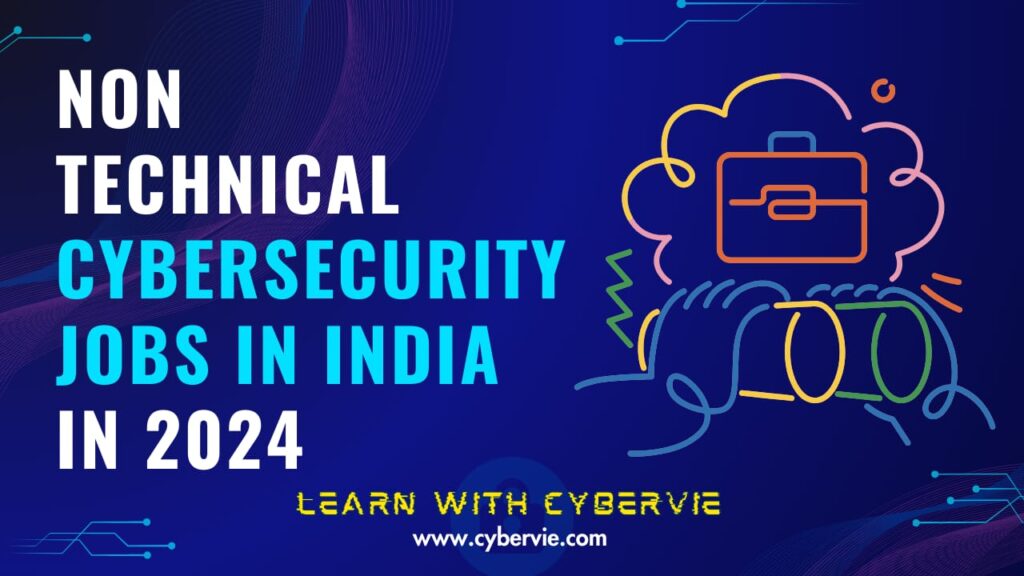Non-Technical Cyber Security Jobs & Its Importance
There are many jobs in the cyber security discipline that contribute to an organization’s general security posture. There are non-technical jobs that are just as significant in identifying vulnerabilities, installing or implementing protective measures against any attacks, and addressing such incidents.
In order to identify trends and abnormalities that may cause harm or disable systems, one should communicate effectively, have strong observation powers as well be analytically competent, and have a deep understanding of cyber concepts.
Top 10 Non-Technical Jobs in Cyber Security

Let’s now discuss the actual tasks they perform and how each non-technical job would make an impact:
1. Information Security Analyst
An information security analyst is possibly one of the most well-known non-technical roles in cybersecurity. They are involved in the protection of critical systems and data in organizations.
As expected, this position tops our non-technical cybersecurity professions’ list because you need them to detect threats, identify risks, and implement policies to minimize threats.
This position does not need you to be a technician but knowing something about risks will be a lot helpful and the same goes for security frameworks and cyber security basics.
2. Cyber Threat Intelligence Analyst
There is a constant change in the cyber threat landscape making it essential for businesses to employ Cyber Threat Intelligence Analysts who are not only able to identify potential threats on time but can also analyze them in depth before coming up with actionable intelligence that can help safeguard their data.
Organizations depend on Cyber Threat Intelligence Analysts to stay ahead of possible attacks as the cyber threat landscape changes constantly. These experts analyze incoming threats, carry out in-depth research, and deliver actionable intelligence to safeguard an organization’s data.
3. Security Operations Center (SOC) Analyst
Analysts play a very crucial role in enabling Security Operations Center (SOC) to monitor, evaluate and quickly alarm for security breakthroughs; they purpose at ensuring that the general security well-being of an organization is secured and all network intrusions are dealt with on time.
Among the most preferred cybersecurity professions for non-coders is the SOC analyst; The job position majorly utilizes pre-made impenetrable devices/programs for threat identification despite having very strong built-in mechanisms.
To succeed in this role, you need strong analytical skills; a keen eye for detail paired with the ability to work effectively even when faced by stress.
4. Incident Response Analyst
This job position is held by cyber-security officers who check what affected an organization’s computer network after an attack, and reduce harm caused by these threats while ensuring they do not re-occur next time hence must have good analytical skills among others.
While one does not necessarily need programming skills, having a strong cybersecurity understanding, being able to act fast when there are cases of incidents, and being good at solving problems is vital in this type of work.
5. Compliance Officer
A Compliance Officer’s main duty is to make sure that an organization’s computer systems and networks are safe and in compliance with industry and governmental standards.
In order to ensure that the laid down security procedures meet the current regulations and standards these experts have close working relationships with people in legal and regulatory departments.
While technical knowledge may not be compulsory for this post, it is mandatory and essential to be conscious of the cybersecurity laws, standards, and strategies on how to wade through the complex compliance structures.
6. Security Auditor
Overseeing security measures and steps of assessing the organization; security auditors are imperative in the process. The function they perform is to collaborate with IT departments to detect vulnerabilities in security, evaluate the security features, and ensure legal compliance is met.
While for this position, it may not be necessary for a person to be techies, he or she must know all the current laws, regulations, guidelines, norms related to cybersecurity.
Security auditors evaluate the effectiveness of security processes and accurately determine ways of improvement.
7. Project Manager
In Cybersecurity projects, the prime responsibility of the project manager is to manage groups of programmers, analysts, and software developers.
They may not participate in most of the project’s technical aspects such as coding, but they ensure projects are completed to the specified timelines and costs.
8. Security Risk Assessor
Security risk assessors are responsible for the identification of the application’s security measures and the search for possible breaches. They closely work with the development teams to ensure that they can implement the securities in the best manner.
While it may not be essential I find it useful to have a peaceful understanding of the security frameworks, risk assessment, and the ability to identify possible risks.
9. Cybersecurity Sales Engineer
The biggest reason for that is that sales engineers are the persons who are capable of bridging the gap between technology and business, for cybersecurity sales.
These experts collaborate closely with customers to comprehend their cybersecurity requirements, offer technical assistance, and facilitate the sales process.
Although technical expertise may not be strictly required for this position, it is crucial to have a solid technical background, outstanding communication skills, and the capacity to comprehend intricate cybersecurity solutions.
10. Cybersecurity Consultant
Your duty as a cybersecurity advisor is to consult with and guide companies that want to enhance their security position. Consultants team up with customers closely to find out problems with insecurity, come up with strategies, and then use workable protective measures.
Conclusion
In summary, cybersecurity tasks depend as much on non-technical jobs as they need programming talent for all cyber-related work. This makes non-technical professionals equally important for protecting companies against hacking as programmers are with certain types of cybersecurity tasks.
Moreover, more than 40,000 open positions requiring specialists in cyber security across India now suggest a significant void in expertise within IT professions tied to these sorts of duties proving that cyber security still has room to grow according to the amount of HTML in pendant marks.
Are you ready to start your cybersecurity journey? Enroll in Cybersecurity training at Cybervie today!







